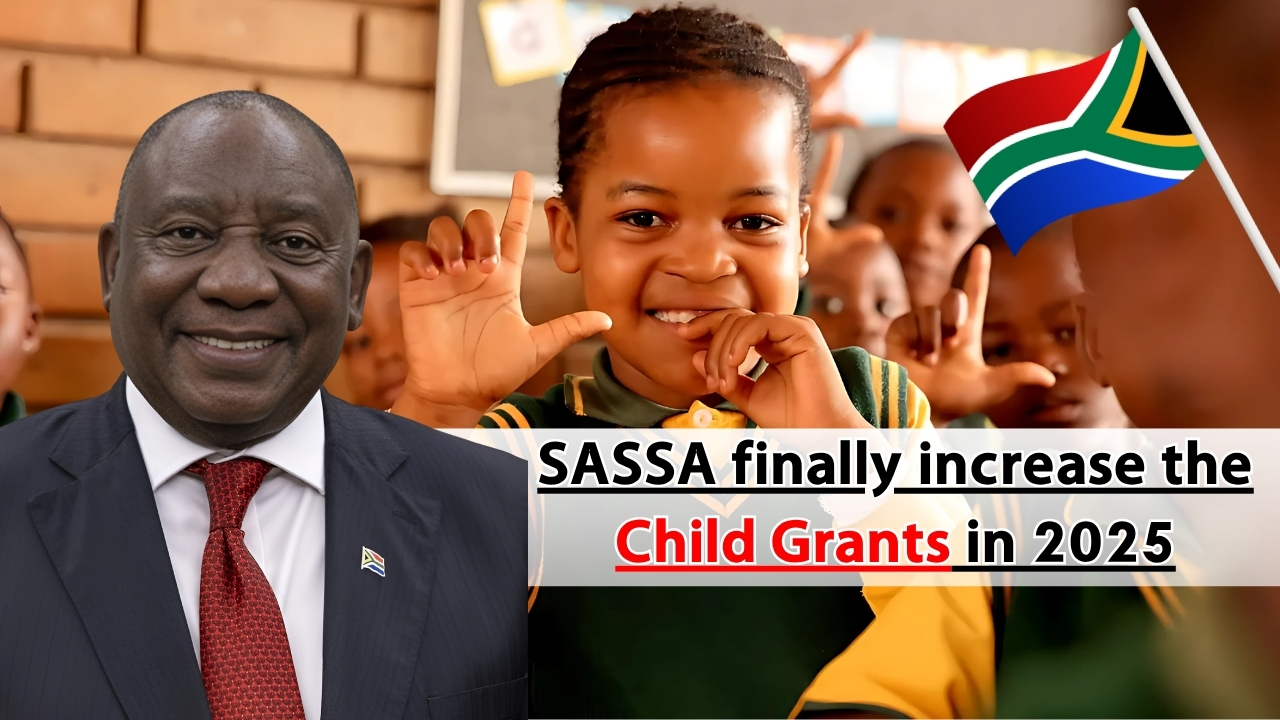Child Grants : South African families receive welcome news as SASSA announces significant increases to Child Support Grants for 2025, providing enhanced financial assistance to caregivers.
The long-awaited adjustment addresses inflation’s impact on household budgets, recognizing that previous grant amounts no longer adequately covered children’s basic needs.
This increase affects millions of children across South Africa, with caregivers now able to access improved monthly payments supporting nutrition, education, and healthcare.(Child Grants)
Understanding the new amounts and claim processes ensures eligible families maximize benefits from these enhanced grants designed to combat child poverty effectively.
New Grant Amounts for 2025
The Child Support Grant increases from R510 to R550 per child monthly, representing a meaningful adjustment that acknowledges rising living costs nationwide.
Foster Care Grants see even larger increases, jumping from R1,130 to R1,230 monthly, recognizing the additional responsibilities foster parents shoulder daily.
Care Dependency Grants for children with severe disabilities increase from R2,090 to R2,280, providing crucial support for specialized care requirements.
These adjustments apply automatically to existing beneficiaries, meaning current grant recipients don’t need to reapply for increased amounts to begin.
The increases take effect from April 2025, with the first enhanced payments scheduled for distribution during the regular April payment cycles.
Additional top-up payments compensate for January through March, ensuring beneficiaries receive full annual increases despite the April implementation date.
Government allocated R8.2 billion additionally to fund these increases, demonstrating commitment to supporting vulnerable children through enhanced social assistance programs.
The percentage increases exceed inflation rates, representing real improvements in purchasing power for families struggling with poverty and unemployment.
Eligibility Requirements
Primary caregivers of children under 18 years qualify for Child Support Grants, including biological parents, grandparents, or legal guardians.
South African citizens, permanent residents, and refugees with official status can apply, provided they meet income threshold requirements for qualification.
Income limits for 2025 increase to R5,200 monthly for single caregivers and R10,400 for married couples, expanding eligibility significantly.
Children must reside with caregivers permanently, attending school regularly if aged 6-18, with exemptions for documented medical or disability reasons.
Multiple children in one household each qualify for individual grants, meaning families with several children receive cumulative monthly support amounts.
Foster parents automatically qualify regardless of income, recognizing that they provide homes for children who cannot live with biological families.
Care Dependency Grant eligibility requires medical assessment confirming severe disability necessitating permanent home care and specialized support for the child.
Non-biological caregivers need court orders or affidavits confirming their caregiving role, protecting children while ensuring grants reach intended beneficiaries.
Application Process for New Beneficiaries
First-time applicants must visit their nearest SASSA office with required documentation to initiate the child grant application process successfully.
Online pre-applications through srd.sassa.gov.za save time by capturing basic information before office visits, streamlining the overall application experience.
Required documents include caregiver’s ID, child’s birth certificate, proof of income, and school attendance confirmation for children over six years.
Clinic cards showing immunization records help verify child welfare compliance, though missing vaccinations don’t automatically disqualify applications if explained properly.
Bank account details expedite payments through direct deposits, though alternative payment methods exist for those without formal banking access currently.
Application processing typically takes 30-60 days, with temporary approvals possible for urgent cases involving children at immediate risk.
SASSA officials conduct home visits for verification purposes, ensuring children genuinely reside with caregivers claiming grants on their behalf.
Free application assistance remains available at SASSA offices, with staff helping illiterate applicants or those struggling with form completion.
Existing Beneficiary Updates
Current grant recipients experience automatic increases without reapplication requirements, as SASSA’s systems update payment amounts internally for April distribution.
Beneficiaries should verify their contact details remain current, ensuring they receive SMS notifications about payment changes and important updates.
Banking details require updating if accounts changed since initial applications, preventing payment failures when increased amounts begin processing in April.
Annual reviews continue for existing beneficiaries, with SASSA conducting life certificate verifications ensuring continued eligibility for grant payments.
School attendance updates become necessary when children reach age six, requiring submission of enrollment proof to maintain grant eligibility.
Foster care reviews occur every two years, necessitating court order renewals to continue receiving the higher foster care grant amounts.
Address changes must be reported within 30 days, as unreported moves can trigger suspension pending verification of new circumstances.
Existing beneficiaries can add newly born or adopted children through simple additions rather than complete new applications for efficiency.
Payment Methods and Schedules
Direct bank deposits remain the preferred payment method, with funds reflecting in accounts on scheduled dates without collection queues required.
SASSA cards through Postbank offer alternative electronic access, functioning at ATMs and retailers nationwide for cash withdrawals and purchases.
Cash payments at designated pay points continue for rural beneficiaries, following established schedules based on ID numbers preventing overcrowding.
Payment dates vary by region and ID number, with SASSA publishing monthly calendars showing exact dates for different beneficiary groups.
The increased amounts apply from April’s payment cycle, meaning May payments (for April grants) reflect the new R550 child grant amount.
Retroactive payments for January through March increases process separately, likely distributed as lump sums during May or June 2025.
Payment notifications arrive via SMS to registered numbers, confirming amounts and reminding beneficiaries about collection dates for their grants.
Child Grants Protecting Your Benefits
Fraud prevention remains crucial, with scammers targeting beneficiaries through false promises of expedited increases or additional grant amounts.
Official SASSA communications never request fees for grant processing or threaten cancellation without proper written notice following established procedures.
Personal information protection prevents unauthorized access, with beneficiaries advised against sharing PINs or allowing others to collect payments.
Regular status checking through official channels helps identify any irregularities early, preventing extended loss of benefits through fraud.
Community awareness programs educate beneficiaries about their rights and responsibilities, empowering them to protect their children’s financial support effectively.
SASSA’s child grant increases for 2025 represent meaningful progress in supporting vulnerable children, requiring only simple claims processes for access.










